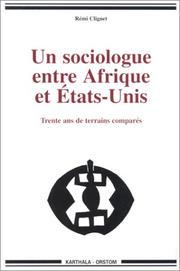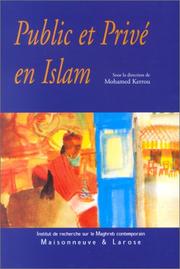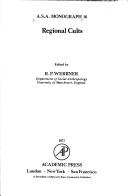| Listing 1 - 10 of 16 | << page >> |
Sort by
|

ISBN: 2865377342 2709912686 9782709912686 9782865377343 Year: 1997 Volume: *52 Publisher: Paris : Karthala,
Abstract | Keywords | Export | Availability | Bookmark
 Loading...
Loading...Choose an application
- Reference Manager
- EndNote
- RefWorks (Direct export to RefWorks)
#SBIB:39A73 --- Etnografie: Afrika --- Sociology --- Methodology. --- Social theory --- Social sciences --- Methodology --- Africa --- Social conditions --- Sociology - Africa --- Sociology - United States --- Sociology - Methodology
Book
ISBN: 9782746222205 2746222205 Year: 2009 Publisher: Paris : Hermès science publications,
Abstract | Keywords | Export | Availability | Bookmark
 Loading...
Loading...Choose an application
- Reference Manager
- EndNote
- RefWorks (Direct export to RefWorks)
Cet ouvrage aborde la question de la fragmentation numérique, c’est-à-dire, du caractère multiforme des disparités voire des différences et le caractère mosaïque des Technologies de l’information et de la communication. Il souligne la diversité des cultures numériques sans les insérer dans un modèle hiérarchique et analyse la manière dont les dispositifs numériques sont déployés, utilisés, appropriés, réinventés. Cette diversité révèle l’importance des acteurs avec leur niveau de culture, mais aussi leurs modes de pensée, leurs croyances, leurs symboles et leurs valeurs. Il ressort nettement des diverses analyses que le développement de l´économie numérique, des produits et des services qui lui sont propres ne correspond pas à l´émergence d´une « intelligence collective » dont tous les usagers pourraient bénéficier de façon équitable. Alors, fracture, mutation, fragmentation ou cloisonnement numérique ? L’essentiel semble résider dans la prise en compte des diversités pour un rayonnement encore plus majestueux de l’arc-en-ciel numérique.
Digital divide --- Communication --- Fossé numérique --- Technologies de l'information et de la communication --- Technological innovations --- Information technology --- Social aspects --- Information - Communication - Digitalization - Cultural sociology - Africa --- Fossé numérique --- Information technology - Social aspects --- Communication - Technological innovations - Social aspects --- Information - Communication - Digitalization - Cultural sociology - Africa. --- Fracture numérique --- Nouvelles technologies de l'information et de la communication --- Aspect social

ISBN: 2706816112 9782706816116 Year: 2002 Publisher: Paris : G.-P. Maisonneuve & Larose,
Abstract | Keywords | Export | Availability | Bookmark
 Loading...
Loading...Choose an application
- Reference Manager
- EndNote
- RefWorks (Direct export to RefWorks)
Islam --- Privacy --- Islamic sociology --- Vie privée --- Sociologie religieuse --- Social aspects --- Aspect social --- Vie privée --- Civilisation islamique --- Islam - Africa, North --- Privacy - Africa, North --- Islamic sociology - Africa, North --- Islam et etat --- Islam et politique

ISBN: 2747587770 9782747587778 Year: 2005 Publisher: Paris : Harmattan,
Abstract | Keywords | Export | Availability | Bookmark
 Loading...
Loading...Choose an application
- Reference Manager
- EndNote
- RefWorks (Direct export to RefWorks)
Group identity --- Identité collective --- Berque, Jacques --- Africa, North --- Afrique du nord --- Social life and customs --- Moeurs et coutumes --- Sociology --- Anthropology --- Berque, Jacques, --- Identité collective --- Sociology - Africa, North --- Anthropology - Africa, North --- Berque, Jacques, - 1910-1995 --- Africa, North - Social life and customs
Book
ISBN: 9964301723 9789964301729 Year: 1989 Publisher: Accra Ghana university press
Abstract | Keywords | Export | Availability | Bookmark
 Loading...
Loading...Choose an application
- Reference Manager
- EndNote
- RefWorks (Direct export to RefWorks)
Religion and sociology --- Africa, West --- Religion --- #SBIB:39A10 --- #SBIB:39A73 --- -Religion and society --- Religious sociology --- Society and religion --- Sociology, Religious --- Sociology and religion --- Sociology of religion --- Sociology --- Antropologie: religie, riten, magie, hekserij --- Etnografie: Afrika --- -Africa, Western --- West Africa --- Western Africa --- -Antropologie: religie, riten, magie, hekserij --- -Religion --- Religion and society --- Africa, Western --- Religion. --- Religion and sociology - Africa, West --- Africa, West - Religion
Book
ISSN: 01699814 ISBN: 9789004303065 9004303065 9789004303065 9789004303065 9789004307568 9004307567 Year: 2015 Volume: 44 Publisher: Boston
Abstract | Keywords | Export | Availability | Bookmark
 Loading...
Loading...Choose an application
- Reference Manager
- EndNote
- RefWorks (Direct export to RefWorks)
Bourdieu in Africa: Exploring the Dynamics of Religious Fields offers a view of religions as social games played by interested actors. Analyzing practices as strategic moves, this critical approach conceptualizes the religious field as relations of exchange and competition between experts and laity, and explores how the actors’ habitus, including religious beliefs, serve to misrecognize and thus legitimize relations of power within the religious sphere and beyond. The authors discuss the volatile religious fields of Nigeria, Ethiopia, Eritrea, Kenya and South Africa, with their variably configured tensions between African traditions, Christianity and Islam, but also consider the interrelations of religion with other social fields, with politics, economy, education and law.
Christianity --- Islam --- Religion and sociology --- Christianisme --- Sociologie religieuse --- Bourdieu, Pierre, --- Religion and society --- Religious sociology --- Society and religion --- Sociology, Religious --- Sociology and religion --- Sociology of religion --- Sociology --- Burdʹe, Pʹer, --- Burdʹe, P. --- Bourdieu, P. --- Pūrtiyu, Piyar, --- Christianity - Africa. --- Islam - Africa --- Religion and sociology - Africa --- Bourdieu, Pierre, - 1930-2002
Book
ISBN: 3839427797 3837627799 Year: 2015 Publisher: Bielefeld transcript Verlag
Abstract | Keywords | Export | Availability | Bookmark
 Loading...
Loading...Choose an application
- Reference Manager
- EndNote
- RefWorks (Direct export to RefWorks)
Wie ordnen sich gesellschaftliche Verhältnisse nach kriegerischer Gewalt neu? Und wie gehen Betroffene und Beteiligte mit weiterhin bestehenden unfriedlichen Beziehungen um? Am Fallbeispiel Sierra Leone untersucht Anne Menzel die Trennlinie zwischen der Zivilbevölkerung und (ehemaligen) Kämpfern, die sowohl in der Forschung zu Nachkriegsgesellschaften als auch in der Peacebuilding-Praxis meist als gegeben angesehen und ganz selbstverständlich gezogen wird. Ihre Studie eröffnet neue und überraschende Perspektiven, indem sie Einblick in das Entstehen und in die andauernde Praxis einer lokalen »Ästhetik der Gefährlichkeit« gibt, in der sich gerade keine eindeutige Trennung von Exkombattanten und Zivilbevölkerung ausmachen lässt. Besprochen in: Wissenschaft & Frieden, 2 (2015) Portal für Politikwissenschaft, 08.10.2015, Anke Rösener
Postwar reconstruction --- Social aspects --- Post-conflict reconstruction --- Reconstruction, Postwar --- Africa. --- Bourdieu. --- Conflict Studies. --- Peace. --- Peacebuilding. --- Political Science. --- Political Sociology. --- Violence. --- War. --- Sierra Leone; Peacebuilding; Krieg; Frieden; Bourdieu; Gewalt; Konfliktforschung; Politische Soziologie; Afrika; Politikwissenschaft; War; Peace; Violence; Conflict Studies; Political Sociology; Africa; Political Science
Book
ISBN: 3839437156 3837637158 9783839437155 9783837637151 Year: 2016 Publisher: Bielefeld transcript Verlag
Abstract | Keywords | Export | Availability | Bookmark
 Loading...
Loading...Choose an application
- Reference Manager
- EndNote
- RefWorks (Direct export to RefWorks)
Urbanisation in Bahir Dar, Ethiopia, poses challenges to urban living conditions. Despite large scale housing programmes from the side of the government, construction and settling processes have largely remained incremental. Nadine Appelhans focuses on the relation between statutory planning and practices of everyday urbanisation. The findings from Bahir Dar suggest that some mundane regimes of building the city are patronised, while others are considered undesired by policy makers. Based on this insight, the author argues that urban development in Bahir Dar needs to be locally grounded, differentiated and inclusive to avoid further tendencies of segregation.
City planning --- Urban policy --- Cities and state --- Urban problems --- Cities and towns --- Civic planning --- Land use, Urban --- Model cities --- Redevelopment, Urban --- Slum clearance --- Town planning --- Urban design --- Urban development --- Urban planning --- Planning --- Government policy --- Management --- City and town life --- Economic policy --- Social policy --- Sociology, Urban --- Urban renewal --- Land use --- Art, Municipal --- Civic improvement --- Regional planning --- Africa. --- Bahir Dar. --- Case Study. --- City. --- Cultural Anthropology. --- Ethiopia. --- Ethnology. --- Socio-Economic Segregation. --- Sociology. --- Urban Developement. --- Urban Living Conditions. --- Urban Planning. --- Urban Policy. --- Urban Studies. --- Environmental planning --- urban planning --- urban sociology --- urban development --- urbanization --- Ethiopia --- Urbanisation; Ethiopia; Bahir Dar; Urban Planning; Case Study; Urban Living Conditions; Urban Policy; Urban Developement; Socio-Economic Segregation; City; Urban Studies; Ethnology; Cultural Anthropology; Sociology; Africa --- Urbanisation; Ethiopia; Bahir Dar; Urban Planning; Case Study; Urban Living Conditions; Urban Policy; Urban Development; Socio-Economic Segregation; City; Urban Studies; Ethnology; Cultural Anthropology; Sociology; Africa --- Urban Development.
Book
ISBN: 0905450817 Year: 1992 Publisher: London New York Ibadan Hans Zell Publishers Spectrum Books
Abstract | Keywords | Export | Availability | Bookmark
 Loading...
Loading...Choose an application
- Reference Manager
- EndNote
- RefWorks (Direct export to RefWorks)
Education --- -Educational sociology --- -Identity (Psychology) --- -Personal identity --- Personality --- Self --- Ego (Psychology) --- Individuality --- Education and sociology --- Social problems in education --- Society and education --- Sociology, Educational --- Sociology --- Children --- Education, Primitive --- Education of children --- Human resource development --- Instruction --- Pedagogy --- Schooling --- Students --- Youth --- Civilization --- Learning and scholarship --- Mental discipline --- Schools --- Teaching --- Training --- Congresses --- Aims and objectives --- #A9805E --- -Congresses --- Educational sociology --- Identity (Psychology) --- Personal identity --- Africa --- Education - Africa - Congresses. --- Educational sociology - Africa - Congresses. --- Identity (Psychology) - Africa - Congresses.

ISBN: 0127449507 9780127449500 Year: 1977 Volume: 16 Publisher: London Academic press
Abstract | Keywords | Export | Availability | Bookmark
 Loading...
Loading...Choose an application
- Reference Manager
- EndNote
- RefWorks (Direct export to RefWorks)
Cults --- Religion and sociology --- Sociologie religieuse --- #SBIB:39A10 --- 316:2 --- -Religion and sociology --- -Religion and society --- Religious sociology --- Society and religion --- Sociology, Religious --- Sociology and religion --- Sociology of religion --- Sociology --- Alternative religious movements --- Cult --- Cultus --- Marginal religious movements --- New religions --- New religious movements --- NRMs (Religion) --- Religious movements, Alternative --- Religious movements, Marginal --- Religious movements, New --- Religions --- Sects --- Antropologie: religie, riten, magie, hekserij --- Godsdienstsociologie --- Addresses, essays, lectures --- Conferences - Meetings --- -Antropologie: religie, riten, magie, hekserij --- 316:2 Godsdienstsociologie --- -316:2 Godsdienstsociologie --- Religion and society --- Cults - Africa --- Religion and sociology - Africa
| Listing 1 - 10 of 16 | << page >> |
Sort by
|

 Search
Search Feedback
Feedback About UniCat
About UniCat  Help
Help News
News